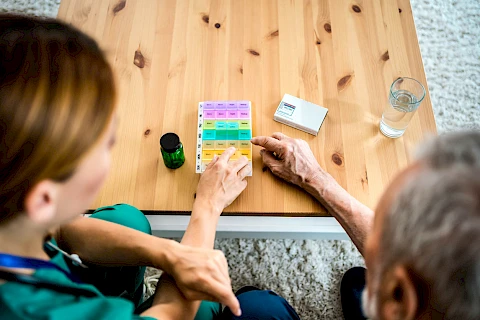
As our loved ones grow older, ensuring their safety becomes a top priority. One critical area caregivers need to focus on is medication safety. Proper medication management can prevent health complications and accidents, and improve quality of life for seniors.
Medication Challenges for Seniors
As people age, they often face various health issues that require medication, and seniors can encounter several challenges with their medication regimen. They may have to manage multiple prescriptions, leading to confusion and the risk of missed doses. Age-related changes can also affect how medications are absorbed and processed. This is where caregiver involvement becomes necessary, helping seniors navigate these complexities and ensuring they take medication safely.
Effectively Organizing Medications
A well-planned medication schedule is vital for safety and adherence. Start by creating a clear schedule that specifies what medication to take and when. Pill organizers can help ensure the correct dose is taken at the right time. Consider using mobile apps for medication reminders, which can be handy tools for tech-savvy seniors or caregivers seeking a digital solution.
Vigilance for Side Effects
It's important to monitor seniors for side effects, as they may not be able to communicate discomfort easily. Watch for symptoms like dizziness, nausea, or confusion, which are typical side effects of many medications. If you notice any unusual changes in a senior's health or behavior, contact their healthcare provider immediately. Documentation of these effects can also be helpful for medical professionals to adjust prescriptions if necessary.
Communicating With Healthcare Providers
Open and regular communication with healthcare providers is key to managing medications safely. Be proactive during medical appointments. Ask questions about new prescriptions, including potential side effects and interactions with current medications. Always keep an updated list of all medications the senior is taking, including over-the-counter drugs and supplements, and share it with doctors and pharmacists.
Strategies for Medication Adherence
Ensuring that seniors take their medication as prescribed can sometimes be challenging. Use techniques like pairing medication intake with daily routines (e.g., meals or bedtime) to make it easier to remember. Reminders are invaluable! Alarms on phones or dedicated medication reminder systems can ensure doses aren't missed. Consistency is necessary for medication effectiveness and safety.
Safe Storage Practices
Proper storage of medication ensures its effectiveness and prevents accidents.
- Store medications in a cool, dry place away from direct sunlight.
- Humid bathrooms aren't ideal.
- Always keep medications out of reach of children and pets to avoid accidental ingestion.
- Clearly label each container to prevent mix-ups and safely dispose of expired or unused medications.
Need Help With Medication Management?
Medication safety for seniors requires careful planning and monitoring, but it's vital for their health and well-being. When they follow these tips, caregivers can safeguard their loved ones.
If you need support with in-home care, from friendly companionship to medication management, Senior Helpers of Southern New Hampshire is here for you. We proudly serve families in the Manchester, Derry, Rochester, Dover, and Salem areas. Contact us today for assistance with looking after your senior loved ones and supporting their independence and quality of life.